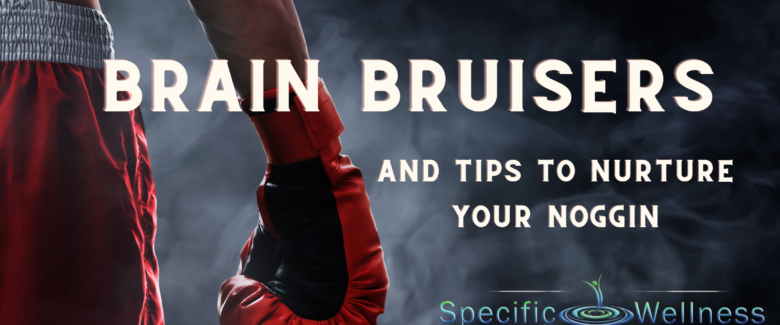|
Our brain is our greatest resource. We think with it all the time but we don’t think about it as much as we should. Protecting our brains should be the most important thing we do for our health and wellness. Over the next few posts, we are going to cover the following topics on brain health. -Brain bruisers: Know what to avoid for healthy brain function -Brain brilliance: Learn how to create a sharper mind -Brain boosters: Supplements that help nurture and heal your brain -Brain, bok choy: Food that feeds your brain |
|
Brain Damage Comes in All Forms |
|
|
Aggressive sports are most known for causing head trauma. Football, hockey, and rugby top the list. This is why helmets are so important.
Car accidents are at an all-time high and addiction plays into this. You would think I’m talking about addiction to alcohol and drugs but it’s actually addition to our phones. According to 2020 NHTSA data, cell phone use or texting while driving was a factor in:
|
|
|
In the next post I will share a secret function that you can use to decrease your phone addiction by 50 minutes a day. |
|
Symptoms of Brain Dysfunction |
|
|
|
The Top Causes of Brain Dysfunction |
|
|
Our brains are who we are, what we do and how we do it. You would think we would be more protective of this precious resource. Dr. Daniel Amen believes that low blood flow is the number one brain imaging predictor of Alzheimer’s disease. Low blood flow can come from overuse of caffeine, nicotine, marijuana, and alcohol. Add to this, other toxins, such as MSG, aspartame and heavy metals, like aluminum and mercury. Even excessive sugar intake can contribute to low blood flow. Your cells are filled with water. Think of them like big juicy grapes. 60% of all the body’s water is in our cells and only 40% lies outside the cells. When you are exposed to toxins or excessive blood sugar, the body in its brilliance, will dilute the toxins by moving the water from inside the cell to outside the cell. Your cells turn from grapes to raisins. This extra extracellular fluid causes pressure on blood vessels, decreasing blood flow. |
|
“Wait! Did You Just Dis My Cuppa Joe?” |
|
|
I’m going to get a lot of flack from my caffeine lovers, but you need to know that caffeine is addictive and stressful on your body and brain. It increases the stress hormone, cortisol, which directs fat to deposit in the belly and keeps you in fight or flight mode (which is why you use it for focus and energy). Coffee is also known to often be contaminated with mold another brain bruiser or neurotoxin. Coffee can constrict blood flow by up to 30%. Without blood flow to the brain you’re not going to get oxygen to the brain and you’re not going to get nutrients to the brain. Your brain runs on oxygen and nutrients. It’s no wonder you have brain fog, fatigue, loss of clarity and focus. |
|
|
In the upcoming article, Brain Bok Choy: Food that Feeds Your Brain, I will share with you a delicious Coffee Alternative |
|
|
Other toxins that affect the brain include industrial seed oil in processed foods (canola oil, soybean oil and others), glyphosate, pesticides, herbicides, antibiotics, psychiatric medication, parabens, phthalates, BPA, general anesthesia, fragrances and out gassing from paint, carpeting and furniture. When Beth came to see me she was suffering from brain fog and fatigue. In fact, she was having to take naps and worried if she could maintain her accounting job. We did a test called a NutrEval by Genova Diagnostics and found that she had a genetic mutation that makes it difficult for her to break down toxins. When I inquired further, she admitted that she gets headaches when she walks down the detergent aisle in grocery stores. Working together, by reducing her toxic load and using nutrients to increase her ability to neutralize toxins, she was able to regain her energy and clarity. |
|
A New Name for Alzheimer’s Disease |
|
|
Alzheimer’s disease is a neurodegenerative disease that often shows as memory loss and dementia. There is growing evidence that high blood sugar and insulin resistance is linked to Alzheimer’s disease to the extent that some researchers are calling it type 3 diabetes. Insulin resistance is the body’s inability to get glucose into the cells to provide energy for the body to function. Insulin resistance has been found in the brains of Alzheimer’s patients. This is one of many reasons I test insulin as well as glucose and hemoglobin A1c when my patients work with me to discover the cause of their fatigue and brain fog. |
|
|
|
|
I can’t let you leave without talking about the importance of sleep. Your brain works hard and needs time to recover and restore. If you are getting less than 6 hours of sleep a night or your sleep is interrupted and you are waking up tired and groggy, try going off caffeine and avoiding electronics before bed. Make an appointment with me if you are still struggling and we will figure it out together. |
|
|
|
|
If this article was helpful please let me know. My goal is not to freak you out but to have you consider all the different ways you can keep your brain brilliant. |


